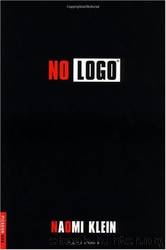No logo by Naomi Klein

Author:Naomi Klein [Klein, Naomi]
Language: ita
Format: epub
Tags: Antiglobalizzazione, Saggio
ISBN: 9780002559195
Publisher: Flamingo
Published: 2000-10-14T22:00:00+00:00
He explains that since all the materials are imported, nothing is actually manufactured in the factories, only assembled. (The components are manufactured in yet another country, where the workers are more highly skilled, though still cheaper than U.S. or European workers.) It's true, now that Tujan mentions it, that when I climbed up the water tower and looked down on the zone, part of what contributed to the unbearable lightness of Cavite was that apart from one incinerator, there were no smokestacks. That's a bonus for the air quality in Rosario but odd for an industrial park of Cavite's size. Neither was there any local rhyme or reason to what was being produced. When I walked the zone's freshly paved streets, I was surprised by the variety of manufacturing going on. Like most people, I had thought that Asian export zones were mostly filled with garment and electronics producers, but not Cavite: a factory making car seats sat next to one making sneakers, across the way from a factory with dozens of aluminium speedboats piled up by its gate.
On another street, the open doors of a factory revealed racks of dresses and jackets, right next to the plant where Salvador made novelty key chains and other small toys. "You see?" says Antonio Tujan. "We have a country whose industry is so deformed, so unbelievably mishmash, that it cannot exist by itself. It's all a myth, you know. They talk about industrialization in the context of globalization, but it's all a myth."
Mo wonder the promise of industrialization in Cavite feels more like a threat. The place is a development mirage.
The Shoppers Take Flight
The fear that the flighty multinationals will once again pull their orders and migrate to more favourable conditions underlies everything that takes place in the zones. It makes for an odd dissonance: despite the fact that they have no local physical holdings — they don't own the buildings, land or equipment — brands like Nike, the Gap and IBM are omnipresent, invisibly pulling all the strings. They are so powerful as buyers that the hands-on involvement owning the factories would entail has come to look, from their perspective, like needless micromanagement. And because the actual owners and factory managers are completely dependent on their large contracts to make the machines run, workers are left in a uniquely weak bargaining position: you can't sit down and bargain with an order form. So even the classic Marxist division between workers and owners doesn't quite work in the zone, since the brand-name multinationals have divested the
"means of production," to use Marx's phrase, unwilling to encumber themselves with the responsibilities of actually owning and managing the factories, and employing a labour force.
If anything, the multinationals have more power over production by not owning the factories. Like most committed shoppers, they see no need to concern themselves with how their bargains were produced —they simply pounce on them, keeping the suppliers on their toes by taking bids from slews of other contractors. One contractor, Young 11 Kim of Guatemala, whose Sam Lucas factory produces clothing for Wal-Mart and J.
Download
This site does not store any files on its server. We only index and link to content provided by other sites. Please contact the content providers to delete copyright contents if any and email us, we'll remove relevant links or contents immediately.
| Anarchism | Communism & Socialism |
| Conservatism & Liberalism | Democracy |
| Fascism | Libertarianism |
| Nationalism | Radicalism |
| Utopian |
The Secret History by Donna Tartt(16645)
The Social Justice Warrior Handbook by Lisa De Pasquale(11492)
Thirteen Reasons Why by Jay Asher(7797)
This Is How You Lose Her by Junot Diaz(5791)
Weapons of Math Destruction by Cathy O'Neil(5045)
Zero to One by Peter Thiel(4832)
The Myth of the Strong Leader by Archie Brown(4795)
Promise Me, Dad by Joe Biden(4453)
Beartown by Fredrik Backman(4429)
Stone's Rules by Roger Stone(4421)
How Democracies Die by Steven Levitsky & Daniel Ziblatt(4407)
The Fire Next Time by James Baldwin(4349)
100 Deadly Skills by Clint Emerson(4084)
A Higher Loyalty: Truth, Lies, and Leadership by James Comey(4038)
Rise and Kill First by Ronen Bergman(4017)
The David Icke Guide to the Global Conspiracy (and how to end it) by David Icke(3890)
The Farm by Tom Rob Smith(3878)
Secrecy World by Jake Bernstein(3787)
The Doomsday Machine by Daniel Ellsberg(3736)
